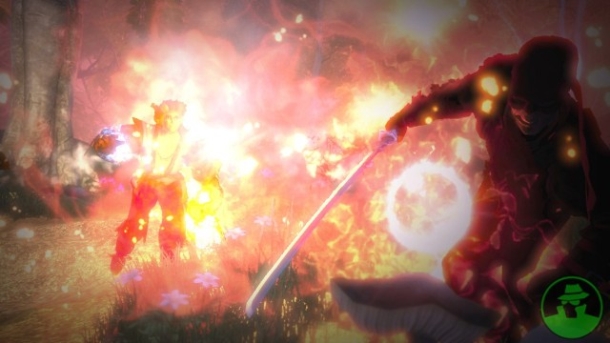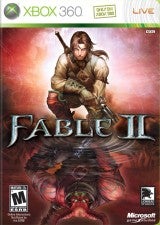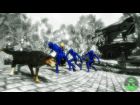
Games are virtual. When you turn on the console, a world appears; when you turn it off, no trace remains. Except for the achievements you earned -- which fortify your Gamerscore and self-esteem, blip by blip. The Underachiever tracks the productivity of one gamer playing to catch up to his peers. What do games feel like when they're used for work?
A Valuable Experience
So I want to be a hero.
This is what Fable II has been telling me, although I know that my own experience contains no acts of heroism. I trace the glowing green guide that runs from town to town, mashing buttons where appropriate to extend the story, like turning the pages of a book. The book being a technical manual. See, playing Fable II is like assembling a model kit from the diagrams shown. As I have written, I'm not into gameplay narratives. But each step that I take in Fable II's Albion builds some kind of picture.
For instance, bystanders everywhere tell me "you're amazing" and "oh, wow!" when I let out a fart. That's an easy 5G: The Show-off. My every action drags along with it unsolicited commentary. Remarks from the bard trailing me, beamed instructions from the woman I met in the intro, pop-ups from the game interface. Even farting carries such narrative weight that I simply have to play along with the game's story about myself.

But it's ultimately not a flattering story, and it also contains mixed messages. Early in the game, I stand among astonished gypsies, dancing and arm-pumping and farting away, the center of attention. The timing minigame required to perform these feats isn't exactly compelling, but it sends admirers running across the village, and rewards me with 10G: The Pied Piper, so I must be doing something great.
Later in the game, I stalk a rabbit across the countryside, feeling naughty because I have unlocked the game's safety, enabling me to shoot a friendly creature. The game told me to! Seconds later, I've put a bullet in the rabbit and won 5G: The Hunter. But I have also become slightly more evil, I'm told, no room for debate. If only Fable II would tell me what that achievement means now.
Nonetheless, it is clearly a game about values. Flash forward, and I've been awarded a whopping 50G: The New Hero for slaughtering some bandit named Thag. And I do really slaughter him, jolting him with blasts of electricity while I hack him with my sword -- and my dog tries to get a piece, too. His fate is much worse than the rabbit's. Yet, rather than brand me a murderer, the townsfolk sing my praises as if I had peppered them with farts.
"Your actions continue to shape the world," I'm told by the girl in my ear. In other words, the pages of the story are being turned. But I've hardly felt less clear about what exactly I'm doing and why. Being a hero seems less and less desirable the more I play. My achievements are dubious, which makes the achievement points feel like stolen property.

After Thag, whatever interest I had in helping "shape the world" wanes. I refocus my energy on another of my given goals: chasing women around town. I seduce them easily, as the game suggests, with combinations of whistling, farts and dancing. I find one selling meat at a local market. Another is a traveler that passes me in mid-fart, and a third is a housewife that quickly forgets about her husband. It's not long before I am running around Albion with the three dangling from my arms, each wondering when they'll get their engagement ring.
I think of my new relationships as achievement lifelines. 10G: The Romantic lands in my profile after I pull off an especially good date with one of my followers. Then comes 5G: The Persuader once I've impressed another of them enough to offer me a present.
Is Peter Molyneux still making God games with Fable? I feel a certain sense that I have earned the women, unlike my achievements. I'm reluctant to leave them behind, even though they keep trapping me behind doorways and between furniture. The game tells me that the rings I've been offering them aren't good enough to be accepted, which encourages me to keep them around until I find better ones. And let's not forget the "Swinger" achievement for scoring with all three at once, which still eludes me.

Because they are my rightful earnings, my girlfriends won't leave until I drop them like cargo. They follow me into other people's homes, into deep ravines and dark caves, through rainy cemeteries and straight into bandit encampments. They're sometimes terrified when I draw my sword, or when I conjure magical blades that impale enemies from behind. But they mostly carry on about the rings. It's a surreal image, the fairytale courtship set amidst Braveheart levels of blood and violence.
And when I notice that my spoils of war, the treasure I ransack from locked chests or unearth in hostile territory, consist largely of trinkets that I am meant to give them -- to reinforce their loyalty to me -- I realize that the crazy picture is no accident. The game suggests that my female followers are the reason I have been playing all along.
One last achievement, 5G: The Muse, pings because I've impressed a bard enough to sing about me. But I would rather not have this kind of recognition; I'd rather that my achievements had no value, that the points merely tracked my progress as a player and not a human being. Ideally, my achievements would represent nothing.
Achievements earned: 11
Points gained: 110
Ryan Kuo is an editor at Kill Screen Magazine, and a freelance writer and artist based in Brooklyn, NY. Find him on Xbox Live and Twitter as twerkface. And please don't laugh at his Gamerscore -- he's working on it.





